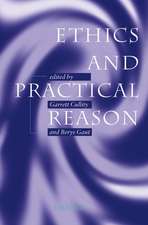Moral Psychology: A Contemporary Introduction: Routledge Contemporary Introductions to Philosophy
Autor Valerie Tiberiusen Limba Engleză Paperback – 26 iun 2014
| Toate formatele și edițiile | Preț | Express |
|---|---|---|
| Paperback (2) | 280.92 lei 3-5 săpt. | +21.41 lei 6-10 zile |
| Taylor & Francis – 31 iul 2023 | 280.92 lei 3-5 săpt. | +21.41 lei 6-10 zile |
| Taylor & Francis – 26 iun 2014 | 433.90 lei 6-8 săpt. | |
| Hardback (2) | 1000.27 lei 6-8 săpt. | |
| Taylor & Francis – 31 iul 2023 | 1000.27 lei 6-8 săpt. | |
| Taylor & Francis – 20 iun 2014 | 1001.84 lei 6-8 săpt. |
Din seria Routledge Contemporary Introductions to Philosophy
-
 Preț: 311.90 lei
Preț: 311.90 lei -
 Preț: 316.33 lei
Preț: 316.33 lei -
 Preț: 296.58 lei
Preț: 296.58 lei -
 Preț: 265.28 lei
Preț: 265.28 lei -
 Preț: 287.79 lei
Preț: 287.79 lei -
 Preț: 295.29 lei
Preț: 295.29 lei -
 Preț: 302.64 lei
Preț: 302.64 lei -
 Preț: 295.63 lei
Preț: 295.63 lei -
 Preț: 311.47 lei
Preț: 311.47 lei -
 Preț: 265.87 lei
Preț: 265.87 lei -
 Preț: 268.17 lei
Preț: 268.17 lei -
 Preț: 310.22 lei
Preț: 310.22 lei -
 Preț: 341.81 lei
Preț: 341.81 lei - 20%
 Preț: 239.80 lei
Preț: 239.80 lei -
 Preț: 342.06 lei
Preț: 342.06 lei -
 Preț: 279.27 lei
Preț: 279.27 lei -
 Preț: 284.10 lei
Preț: 284.10 lei -
 Preț: 372.91 lei
Preț: 372.91 lei -
 Preț: 280.28 lei
Preț: 280.28 lei -
 Preț: 326.04 lei
Preț: 326.04 lei -
 Preț: 293.52 lei
Preț: 293.52 lei -
 Preț: 280.92 lei
Preț: 280.92 lei - 9%
 Preț: 937.68 lei
Preț: 937.68 lei -
 Preț: 350.02 lei
Preț: 350.02 lei -
 Preț: 231.05 lei
Preț: 231.05 lei -
 Preț: 388.42 lei
Preț: 388.42 lei -
 Preț: 281.42 lei
Preț: 281.42 lei -
 Preț: 375.33 lei
Preț: 375.33 lei -
 Preț: 386.00 lei
Preț: 386.00 lei -
 Preț: 346.33 lei
Preț: 346.33 lei -
 Preț: 366.80 lei
Preț: 366.80 lei
Preț: 433.90 lei
Nou
Puncte Express: 651
Preț estimativ în valută:
83.04€ • 85.04$ • 69.07£
83.04€ • 85.04$ • 69.07£
Carte tipărită la comandă
Livrare economică 19 martie-02 aprilie
Preluare comenzi: 021 569.72.76
Specificații
ISBN-13: 9780415529693
ISBN-10: 0415529697
Pagini: 256
Ilustrații: 3 Tables, black and white
Dimensiuni: 156 x 234 x 20 mm
Greutate: 0.4 kg
Ediția:New.
Editura: Taylor & Francis
Colecția Routledge
Seria Routledge Contemporary Introductions to Philosophy
Locul publicării:Oxford, United Kingdom
ISBN-10: 0415529697
Pagini: 256
Ilustrații: 3 Tables, black and white
Dimensiuni: 156 x 234 x 20 mm
Greutate: 0.4 kg
Ediția:New.
Editura: Taylor & Francis
Colecția Routledge
Seria Routledge Contemporary Introductions to Philosophy
Locul publicării:Oxford, United Kingdom
Cuprins
Preface
Part One: Moral Psychology and Moral Philosophy
Part One: Moral Psychology and Moral Philosophy
- What Is Moral Psychology?
- What is moral psychology?
- Distinguishing the questions
- Distinguishing psychological states
- Structure and aims of the book:
- What Are Philosophers Doing Here?
- Moral Agents or Blobs of Flesh
- Moral Realism and the Challenge from Evolution
- Responses to the Challenge
- Moral Psychology and Moral Philosophy
- Moral Motivation: what it is and what it isn’t
- Moral Theories and Moral Motivation
- The Challenge of Psychological Egoism
- Psychological Egoism and Empirical Research
- Taking Stock
- Desires and Reasons
- Some Background Distinctions
- Reasons internalism and externalism
- The Humean Theory of Motivation
- Taking Stock
- Emotion & Moral Judgment
- What is an emotion?
- Emotions and Moral Judgment
- Amoralists, Psychopaths and the Debate Between Moral Judgment Internalism and Externalism
- Taking Stock
- Sentimentalism and Rationalism:
- Rationalism and Sophisticated Sentimentalism
- The Kantian Challenge to Sophisticated Sentimentalism
- The Empirical Threat to Rationalism
- Taking Stock
- Virtue
- What kind of state is a virtue?
- Are there any virtues?: The empirical challenge
- Defending Virtue
- Taking Stock
- The Psychology of the Responsible Agent
- Methodology
- Real Self Theories
- Normative Competence
- Are we Competent?: Challenges from Psychology
- Moral Responsibility, Free Will and Determinism
- Free Will and Determinism
- Intuitions and Experimental Philosophy
- Libertarianism and the Challenge from Neuroscience
- Can I Be Excused?
- Should I be moral?: Well-being and the good life
- Prudential Reasons and ‘Good For’
- Theories of Well-Being
- Psychological Evidence for the Well-being – Morality Link
- Conclusion
- How do we know what is morally right?: Moral psychology and moral knowledge
- The Attack on Intuitions: Biases and Trolley-ology
- Intuitions, Intuitionism and Reflective Equilibrium
- Can you get an ought from an is?
- Is and Ought: A Complex Relationship
- Reducing Ought to Is
- Final Thoughts
Notă biografică
Valerie Tiberius is Professor of Philosophy at the University of Minnesota
Recenzii
"The best imaginable introduction to moral psychology. Unrivaled in clarity and scope, Tiberius offers a seamless and stimulating integration of cutting edge empirical research and foundational philosophical theories."
—Jesse Prinz, City University of New York Graduate Center
"Valerie Tiberius’s book is an instant classic—the definitive introductory textbook on philosophical moral psychology. It is wide-ranging and authoritative, synthesizing an enormous amount of information, both scientific and philosophical. It’s also a lot of fun. With her trademark wit and levelheadedness, Tiberius introduces readers to moral philosophy’s most challenging problems and explains how recent scientific discoveries are casting these old problems in a new light. This book is beautifully written, filled with colorful examples that convey Tiberius’ hard-won insights. Each of these chapters is fascinating in its own right, and together they tell a remarkable story that is just beginning. It’s hard to imagine a better introduction to this exciting and rapidly advancing field."
—Joshua Greene, Harvard University
"This is the only text of which I'm aware—the very first one—on moral psychology. It addresses issues at the intersection of agency and normativity. It is a lively, well-written, thoughtful book that is perfect for upper-division undergraduate courses. It is also a good book to bring graduate students and even scholars up to speed on the issues in this area. Highly recommended."
—John Martin Fischer, University of California, Riverside
"Several recent volumes offer collections of readings in the exciting interdisciplinary field of moral psychology, and lots more courses now cover the difficult questions arising at the intersection of philosophy (meta-ethics, moral theory, action theory) and psychology (and other mind sciences). But until now, there has been no text to introduce students to these questions or to guide them through these readings. Valerie Tiberius is an intelligent, clear, and engaging guide. In Moral Psychology: A Contemporary Introduction, she covers a wide range of topics, including moral motivation, virtue, well-being and responsibility, and she manages both to present competing views fairly and to take a stand on which views she favors. Students will learn a great deal from this book. I certainly did."
—Eddy Nahmias, Georgia State University
—Jesse Prinz, City University of New York Graduate Center
"Valerie Tiberius’s book is an instant classic—the definitive introductory textbook on philosophical moral psychology. It is wide-ranging and authoritative, synthesizing an enormous amount of information, both scientific and philosophical. It’s also a lot of fun. With her trademark wit and levelheadedness, Tiberius introduces readers to moral philosophy’s most challenging problems and explains how recent scientific discoveries are casting these old problems in a new light. This book is beautifully written, filled with colorful examples that convey Tiberius’ hard-won insights. Each of these chapters is fascinating in its own right, and together they tell a remarkable story that is just beginning. It’s hard to imagine a better introduction to this exciting and rapidly advancing field."
—Joshua Greene, Harvard University
"This is the only text of which I'm aware—the very first one—on moral psychology. It addresses issues at the intersection of agency and normativity. It is a lively, well-written, thoughtful book that is perfect for upper-division undergraduate courses. It is also a good book to bring graduate students and even scholars up to speed on the issues in this area. Highly recommended."
—John Martin Fischer, University of California, Riverside
"Several recent volumes offer collections of readings in the exciting interdisciplinary field of moral psychology, and lots more courses now cover the difficult questions arising at the intersection of philosophy (meta-ethics, moral theory, action theory) and psychology (and other mind sciences). But until now, there has been no text to introduce students to these questions or to guide them through these readings. Valerie Tiberius is an intelligent, clear, and engaging guide. In Moral Psychology: A Contemporary Introduction, she covers a wide range of topics, including moral motivation, virtue, well-being and responsibility, and she manages both to present competing views fairly and to take a stand on which views she favors. Students will learn a great deal from this book. I certainly did."
—Eddy Nahmias, Georgia State University
Descriere
Moral Psychology: A Contemporary Introduction is the first philosophy textbook in moral psychology.



























